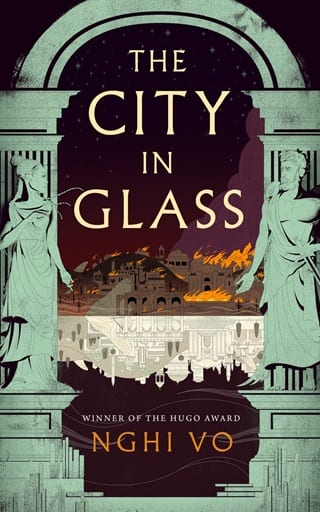Chapter Eleven
ELEVEN
About twelve years after the angel departed, Vitrine came down from adjusting the flow of the river to find people on the beach. She was so startled to hear human voices again that she shied back into the darkness and shrouded herself in shadows, her blood racing and her eyes wide.
They had built a great bonfire on the sand to hold back the night, but she crept closer and closer yet, unblinking and fascinated. Had the first people of her Azril been like this? Had they built fires from the wood that washed up high on the shore, and had they roasted seabirds in the embers of their fire? Had they gestured with broad hands at what had been theirs and pointed to the mountains at what might be theirs again?
With the pleasure of an eavesdropper who knows she will not be caught, Vitrine came to sit at the fire, one more face the men were sure they knew, though if they counted, they would find themselves one more than they had been.
“It was an earthquake that brought down great Azril,” one of the sailors said. “It opened the ground like a woman’s legs, and what came out must surely fall back in.”
“Pah,” snorted another man. “We see what you know of women. No, it was fire, fire started from the toppled candle of a woman in the pleasure quarters. I know this because I knew a man who sailed with one who survived it. He said that it was a courtesan’s candle, and from there raced the doom of the city.”
“That’s a story about disease, didn’t you know? No, Azril fell because the Lord Mayor ordered it. He was in the pay of the Ithars, the horse people. When they gave him the weight of a princess in gold and threw in the princess besides, he opened the gates to let them in, and they leveled it. Time and fate did the rest.”
“Azril fell because angels came from the east and set it afire,” Vitrine said quietly, and suddenly every eye was on her.
She stared at the fire, which sent plumes of writhing smoke into the sky, and she was aware of the men around her surreptitiously reaching for the knives they had concealed in their clothing and the amulets they wore to ward off demons and bad dreams. She was both, and she was not offended.
“You are not welcome to our fire,” the oldest man among them said finally. “You will not poison our food or taint our water. You will strike no man with blindness or ride his back home to turn his children into rats.”
“Children into rats, I remember that one. You must be from the Iray River valley, where they sang of Bavion and Horu for so many years.”
“Indeed we are. You are not welcome at our fire, you will not—”
“I am not, and I will not,” she said. “Only get your story straight. Azril was struck down by angels.”
The men sat quietly, respectfully, and Vitrine was al most ready to rise and fade into the darkness again, nothing more than a story that they would tell others when they returned safely home, when one of the other men spoke up.
“What had Azril done to deserve that fate?”
In an instant, the fire was doused and the beach plunged into darkness. They were men of the Iray River valley, and so they knew the old stories. They did not run, and they did not cry out, but instead they sat still, as still as baby rabbits when the hawk’s shadow appeared.
“Azril was set afire because angels opened their obedient mouths and spoke,” she said, her lips inches from each man’s ear. She was sorry when they did not flinch back from her, when they did not unthinkingly reach back and try to strike her. Then she would have been within her rights to rend them open through the middle, to reach through them and throw what made them living men instead of dead men into the still-steaming coals.
They sat like statues, and for the long hours of the night, she slid from one to the other, the thing in the darkness, the thing with claws, and she sat on their backs and hovered over their heads.
“Azril was set to fire by angels who came from the east. Azril fell because the angels spoke,” she insisted, and no one was foolish enough to ask her again what sin deserved her crumbled towers and the silence after the festival.
She picked through their minds as the stars spun overhead, the Carriage carrying the Weaving Girl chased by the Demon who loved her. There were one or two men with cracks inside them enough that she could lever them wide if she wished, opening up chasms into which whole families could fall.
Vitrine toyed with the idea, let them feel the whisper of her passage and the depth of their own frailty, and then she let it go. It was enough that they knew, and so long as they remembered that Azril fell because the angels spoke, they could continue as cracked men instead of broken ones.
Finally, the sun slipped a gleaming edge over the horizon, and the hold she had on them broke. She slid into a shadow of driftwood, and the men, casting many glances behind them towards Azril, hurriedly packed to return to their ship.
“Wait,” she said, looking at them from the top of a dune, and with dread scored on their faces, they turned to her.
They will not forget that night in a hurry, she thought with satisfaction. They will not forget me so soon, even if I am not Horu or Bavion.
“Leave your clothes on the beach,” she said, and though they looked back and forth between each other, they stripped to the skin and set off again for their ship.
This time, she let them go, and when the striped sail disappeared over the horizon, Vitrine went down to the beach to pick through the piles of discarded garments.
The clothes were rough, of course, wool and linen rather than the silk that had once flowed into Azril like a shining road, but they had been gaily dyed with madder and woad and barberry, set with salt and iron whose savor she could still taste in the threads.
Since the fall of the city, she had gone around in rags when she even thought of it, and in the long days of bury ing the dead and clearing out the stone, her skin served to cover her as well as anything else.
Now she walked among the pile of clothes as if she were at Folade’s on Weave Street, with the smart girls bringing her a dish of pink sugar with her tea and a dozen grades of silk at her fingertips. Folade’s had closed well before Azril went up in flames, Vitrine recalled. Folade had had designs on dressing the Lord Mayor’s family, exclusively and in perpetuity, but her head was turned by an immortal mercenary from Phyrros. The mercenary sailed east with a sail patched with silk and the most talented dressmaker on the continent beside her, not to mention a king’s ransom of silk in the hold, and that had been that.
She will be venerable in her tomb now, if she did not meet with some accident before, Vitrine thought. I wonder if she had children to carry on her trade, if they were half so clever as she was, as ambitious and as skilled.
She had decided that the Mercers, the ones who left, weren’t hers, and they weren’t. She paused, however, thinking of the children of Folade. Folade always wanted children, if not from her own body than of her heart and her wits. It was tempting, seductive even, to imagine one of those children in a workroom on what might someday be Weave Street again, their head bent over a cutting table as their dressmaker’s shears snipped through wool and silk, a tape measure dyed in cochineal thrown carelessly around their neck.
Folade will never return, but perhaps her grandchildren might, Vitrine thought, and a queer shiver ran down her spine. Instead of looking back at the broken city behind her, she looked out over the sea as well, a sailor’s wide orange sash clutched in her hands.
Where had Folade and her mercenary gone? Vitrine’s throat suddenly closed with an almost hundred-year worry about whether that mercenary had taken good care of her, if she was as careful with her mortal dressmaker as she wouldn’t be of her own nearly indestructible body.
Immortal or not, I will tear her into bits so small that not even Folade’s ghost will be able to stitch her back together if she hurt her.
Folade had left so quickly, even for a demon who reckoned a generation a small enough amount of time to spend enjoying a holiday by the river. Phyrros, likely, and then perhaps on to Muying? To the wet paving stones of Brid or the ever-burning towers of Binh Hoa? Who knew?
Vitrine glanced back at the city behind her, the stab of pain inevitable, but rueful frustration coming to live with it as well.
No fine patrons for their skills, no litters or carriages, no streets, no lights, and no one to dress.
She put on a large ocher shirt and a pair of indigo trousers spangled with white rings from where the fabric had been tied tight before dyeing. The orange sash, the best of the lot even to her inexpert fingers, she wrapped around her waist tightly, letting the fringed end hang down to her knees.
Vitrine turned to the horizon where Folade and her mercenary had gone.
“Come back,” she said. “Please. Come home.”
Newly dressed, she walked back to the fallen buildings to make sure they had a home to come back to.
 Fullepub
Fullepub 



